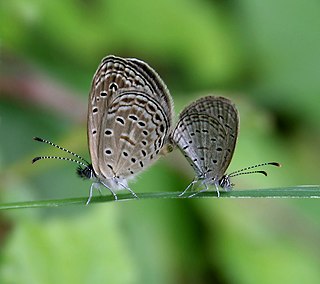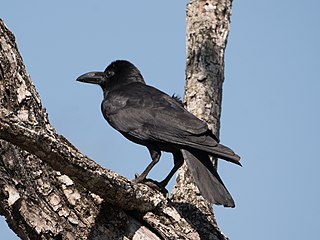
Cheritra freja, the common imperial, is a small butterfly found in India, Indochina, Malaysia and Sri Lanka that belongs to the gossamer-winged butterflies family (Lycaenidae).

Hans Fruhstorfer was a German explorer, insect and shell trader and entomologist who specialised in Lepidoptera. He collected and described new species of exotic butterflies, especially in Adalbert Seitz's Macrolepidoptera of the World. He is best known for his work on the butterflies of Java.

Pithecops is a genus of butterflies in the family Lycaenidae erected by Thomas Horsfield in 1828.

Zizula, commonly called grass blues, is a genus of butterflies in the family Lycaenidae.
Fernandocrambus is a genus of moths of the family Crambidae.

Jackdaws are two species of bird in the genus Coloeus closely related to, but generally smaller than, crows and ravens (Corvus). They have a blackish crown, wings, and tail, with the rest of their plumage paler. The word Coloeus is Neo-Latin, from the Ancient Greek for jackdaws: koloiós (κολοιός). They come from Asia, Europe, Africa and Siberia.

The Indian jungle crow is a species of crow found across the Indian Subcontinent south of the Himalayas. It is very common and readily distinguished from the house crow, which has a grey neck. In the past the species was treated as a subspecies of another crow species, but vocalizations and evidence from ectoparasite co-evolution and phylogenetic evidence have led to it being considered as a distinct species in modern taxonomic treatments. It differs in its voice from the large-billed crow found in the higher elevations of the Himalayas and the eastern jungle crow overlaps in the eastern part of its range. In appearance, it can be difficult to distinguish from either of these species although the plumage tends to be more uniformly glossed in purple and has a longer bill with a fine tip and a less arched culmen. The Himalayan species has a slightly wedge-shaped tail, unlike the rounded tail of the Indian jungle crow and tends to glide a lot.

Monodontides cara is a butterfly of the family Lycaenidae. It is found on Sulawesi.

Curetis sperthis is a species of butterfly belonging to the lycaenid family. It is found in Southeast Asia.

Drupadia rufotaenia is a species of butterfly belonging to the lycaenid family described by Hans Fruhstorfer in 1912. It is found in the Indomalayan realm.

Drupadia theda, the dark posy, is a species of butterfly belonging to the lycaenid family described by Cajetan Felder and Rudolf Felder in 1862. It is found in the Indomalayan realm.










